As well as being crucibles of research, today’s big physics experiments are also factories for students – almost 700 have graduated from the DELPHI experiment at CERN’s LEP electron-positron collider in just over a decade. Tiziano Camporesi finds that physics students are quickly being absorbed by an eager jobs market.
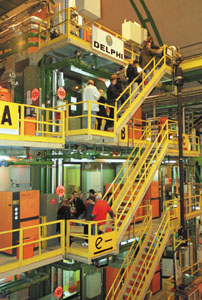
Personal skills are a valuable form of technology transfer. The expertise acquired in the big international collaborations running today’s major physics experiments is diverse – computing, electronics, project management, etc. In addition are the interpersonal skills gained by being a member of a large international team working on a complex problem. Today’s physics students are much in demand.
To investigate this, the DELPHI experiment at CERN’s LEP electron-positron collider analysed the careers of 669 students, mainly those involved in DELPHI since it began running for physics in 1989.
Of these students, 338 obtained a PhD, 89 a masters degree and 242 diplomas. Three nations dominate the sample – Italy (140 students), Germany (120) and France (80). Norway and the UK follow, each with about 40 students (figure 1).
The distribution of the students reflects the resources given to DELPHI by the respective countries (and refers to the university to which the student is attached rather than their nationality). The attraction of DELPHI for students also increased once the experiment began running (figure 2).
There were seven identifiable career outlets (figure 3):
* research: public-funded jobs in universities and research centres;
* teaching in schools and in universities where there is no research activity;
* computing and simulation, mainly in the private sector;
* management in public administration, the private sector and consultancy;
* business, including entrepreneurs and start-ups, but excluding computing and related activities;
* high technology: electronics and other specialized industries;
* graduate school: further education, but not with the DELPHI experiment.
The 19 different nationalities active in DELPHI in many cases have very different traditions. In certain countries (notably France), choosing to follow a doctoral programme in fundamental research implies a commitment to this as a career. In other countries, for example Germany and Italy, the situation is much more open. Here, the skills acquired in the course of thesis work in high-energy physics can be more important than the topic of the thesis.
Research – a job for
life?
Working in high-energy physics at CERN means a certain level of dedication, but it is nevertheless striking how most of the students continue with research, at least for an initial period of a few years. Determining whether ex DELPHIers continued with research later was not so easy, as it is difficult to keep track of students’ progress once they have left their degree-awarding institute.
However, a subsample of 158 ex-students in Austria, Germany, Italy, the Netherlands, Norway, Portugal and the UK revealed a subsequent migration out of research to positions in business, high technology and computing. Assuming that this trend is valid for the whole sample gives the result shown below. This shows that about 50% of students eventually leave research for fast-developing sectors of their national economies.
Comparing data collected in 1996 with those in 2000 shows that physics students have become valuable. With job offers already on the table, they are having to wrap up their thesis work in a hurry.
Career moves after first employment
Career category [All degrees(%), PhD(%)]
high technology 24.4, 19.5
computing 15.7, 13.8
business 7.0, 6.4
management 2.8, 1.9
total private
sector 49.9, 41.6
research 44.3, 55.5
teaching 5.8, 2.9
total public sector 50.1, 58.4
Women on the move
Women make up about 20% of the students involved in the DELPHI experiment today, and, although this has moved down from an all-time high of 30% in 1998, there has been a marked increase over the years. Their initial post-DELPHI job is shown in figure 4. The pattern closely matches that of the overall statistics.
While the study shows that research at an international level is clearly a stimulating environment, most of the students choose not to follow this career path for life. However, whatever they do go on to do, their stay at CERN certainly played a major role.
Further reading
More information about DELPHI is available at “http://delphi.web.cern.ch/Delphi/Welcome.html“.








